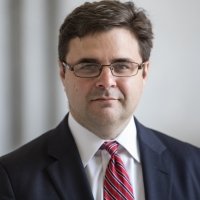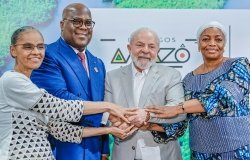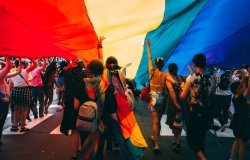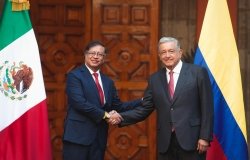The Death of George Floyd and Race Relations in the Americas
Americas 360 is a podcast about the “innumerable ties” among the nations of the Western Hemisphere. Get the inside scoop and the outside perspective on the latest developments from Canada, Latin America, and everywhere in between.
In this week’s special focus edition of Americas 360, our roundtable discusses recent events in the United States in response to the killing of George Floyd while in police custody, and takes a look at how other countries in the Americas have reacted to what’s happening in the U.S. and the subsequent U.S. government response. The panelists then expand the discussion to explore the state of race relations throughout the Americas.
Available on: Spotify; SoundCloud; Apple Podcasts
Listen to previous episodes of Americas 360
Duncan Wood
- "The debate [in Mexico] has been focused on the question of police brutality rather than racism... I continue to press the point that there is an opportunity in Mexico and beyond that is presented to us by this situation to discuss race on a more overt level."
- "It's extraordinarily consistent throughout the hemisphere that you see this correlation between skin tone, prosperity, [and] opportunities."
- "We’re at a pivotal moment right now. We’re seeing a nationwide conversation about reforming police departments across this nation. Hopefully in a few years’ time that gives the United States a positive experience that can be taken out in to the hemisphere but you need to have successes before you can begin to sell your product."
Christopher Sands
- "[Recent events] have just made every diplomat that has to represent U.S. values [and] emphasis on human rights or democracy to counterparts abroad find his or her job so much more difficult."
- "Another thing that’s been particularly shocking for countries…that have gone through military dictatorship is the kind of language that’s being used, by President Trump [and] the Trump administration and the militarization of the response. This idea that you have troops on the street…the use of this [violent] rhetoric…the call to dominate the streets. It’s a kind of heavy handed policing that we have traditionally stood against in Latin America."
Benjamin Gedan
- "We often point to inadequacies in the US but say we address them effectively. If we try to fight corruption in Latin America we say we have it here too. We have racial inequalities. We have abuse of policing. The question is how will the system react now that it’s once again been brought to light?"
- "In Latin America there is very little reluctance to criticize the United States when there is an opportunity."
Ricardo Zúñiga
- "The real question is where do we go from here? There’s all of this energy in civil society that we’re seeing in several countries. Does this turn into anything lasting?"
- "Criticism of the United States, while valid, is often not accompanied by some reflection in countries [in the Americas]... It's much easier to see disparities and difference and discrimination in another country than it is to see in one's own."
Guests

Cynthia J. Arnson

Benjamin Gedan

Christopher Sands

Duncan Wood

Ricardo Zúniga

Mexico Institute
The Mexico Institute seeks to improve understanding, communication, and cooperation between Mexico and the United States by promoting original research, encouraging public discussion, and proposing policy options for enhancing the bilateral relationship. A binational Advisory Board, chaired by Luis Téllez and Earl Anthony Wayne, oversees the work of the Mexico Institute. Read more

Latin America Program
The Wilson Center’s prestigious Latin America Program provides non-partisan expertise to a broad community of decision makers in the United States and Latin America on critical policy issues facing the Hemisphere. The Program provides insightful and actionable research for policymakers, private sector leaders, journalists, and public intellectuals in the United States and Latin America. To bridge the gap between scholarship and policy action, it fosters new inquiry, sponsors high-level public and private meetings among multiple stakeholders, and explores policy options to improve outcomes for citizens throughout the Americas. Drawing on the Wilson Center’s strength as the nation’s key non-partisan policy forum, the Program serves as a trusted source of analysis and a vital point of contact between the worlds of scholarship and action. Read more

Canada Institute
The mission of the Wilson Center's Canada Institute is to raise the level of knowledge of Canada in the United States, particularly within the Washington, DC policy community. Research projects, initiatives, podcasts, and publications cover contemporary Canada, US-Canadian relations, North American political economy, and Canada's global role as it intersects with US national interests. Read more

Argentina Project
The Argentina Project is the premier institution for policy-relevant research on politics and economics in Argentina. Read more

Brazil Institute
The Brazil Institute—the only country-specific policy institution focused on Brazil in Washington—works to foster understanding of Brazil’s complex reality and to support more consequential relations between Brazilian and US institutions in all sectors. The Brazil Institute plays this role by producing independent research and programs that bridge the gap between scholarship and policy, and by serving as a crossroads for leading policymakers, scholars and private sector representatives who are committed to addressing Brazil’s challenges and opportunities. Read more






